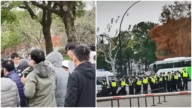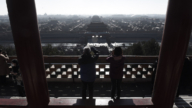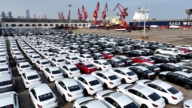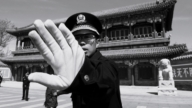【新唐人2014年04月17日訊】中國大陸有媒體和研究機構,日前根據當局數據,計算出中國23個省份的「土地財政依賴度」,發現超8成地方政府將土地出讓收入,作為地方債務償還的主要渠道。分析指出,中國的政府運行成本過高,地方政府又養著龐大的黨、政、軍,如果沒有土地財政做支撐,這些政府早就停擺了。
4月14號,《中國經濟週刊》、「中國經濟研究院」聯合發佈的《中國23個省份土地財政依賴度排名報告》中,浙江省以66.27%排名第一﹔天津排名第二,依賴度64.56%。
也就是說,浙江、天津兩地政府負有償還責任的債務,有2/3的份額要靠賣地來償還。
根據中共審計署公布,截至2012年底,中國11個省級、316個市級、1,396個縣級政府,承諾以土地出讓收入償還的債務餘額為3萬4,865億 2,400萬元。
審計署的這一調查,是針對中國391個市、2,778個縣進行的。在被審計調查的市級政府中,承諾以土地收入來還債的高達81%,縣級政府也超過50%。
中國金融智庫研究員鞏勝利向《新唐人》表示,中國各級省、市、縣級政府的債務,都要靠土地財政來償還,充分表明地方政府對土地財政依賴的普遍性,但地方政府靠賣地還債已不可持續。
中國金融智庫研究員鞏勝利:「全世界都知道,土地買賣不能重復進行,你不能今天賣了這塊地,明天再賣,後天再賣,因為土地的資源都是稀有資源。改革開放35年,可以這麼說,像廣東、沿海的地區﹕廣東、浙江、福建、上海、山東,土地幾乎沒有空地了,都被開發用盡了。」
鞏勝利指出,中國的政府運行成本太高,在中國財政分成方面,中央政府佔財政總歸數據的60%以上。
鞏勝利:「而地方政府,包括省、地級市、縣、鎮、鄉、鄉鎮,最低一層的叫村民委員會,只享用了政府財政劃分的比例大概40%,你想想看,它地方政府又養了黨、政、軍,比如共產黨的各級機構,還有政府的各級機構,他錢從哪裏來,沒有土地這些政府早就停擺了。」
有大陸網民感嘆, 怪不得各個地方政府瘋狂的徵地拆遷,他們不惜殺人放火,來搶老百姓的房屋土地!
原《陝西電視臺》記者馬曉明指出,土地財政不但給中國經濟帶來了一系列的不利影響,同時,滋生出的風險也轉嫁到老百姓身上,形成了一個從中央到地方,對老百姓土地進行掠奪的團夥。
原《陝西電視臺》記者馬曉明:「從我十幾年關注土地問題的情況,我認為它就是赤裸裸的土地掠奪,就是政府,黨、政官員對土地的掠奪,就是自改革開放以後到現在,所形成的這種大規模的、普遍的、持久的對人民土地的掠奪。」
馬曉明說,這種掠奪,最早是由中共前領導人鄧小平,以及中央的一些官員,和他們的子女、親屬,以及身邊的工作人員,在各地圈佔土地、賣土地開始的。
馬曉明:「以後這個風就從中央擴展到省、市、區、縣、街道辦事處,直到現在,到了村幹部這一級,實際上村幹部他不可能去動用任何一寸土地,他必須要有政府的批准,或者政府官員,上級官員默許。所以它整個形成了從中央到地方,一直到村的這樣一個龐大的掠奪土地,侵害人民基本權力的這樣一個強盜團夥。」
近年來,大陸各地不斷髮生因強徵土地、強拆房屋,所引發的大規模官民衝突事件,許多抗議民眾甚至用自焚、跳樓等自殘手段,來維護自身的權益。在中國的群體性抗爭中,60%到70%是與房屋拆遷、徵地有關。
採訪編輯/李韻 後製/陳建銘
China’s Local Regimes: 80% Rely On Land Selling To Repay Debts
Chinese media and research institutes
have used official data to show that 23 local
provinces financially depend on the land.
The data shows that 80% of local regimes
sell land as a major channel for repaying debts.
Analysts say that the Chinese
regime has high operating costs.
Each local regime has to take care of large groups of
Communist Party members, and local army divisions.
Without revenue from selling land to
support the regime, it may collapse.
On April 14, China Economic Weekly and the China
Economic Research Institute jointly issued a report.
It is the assessment of the financial dependency
of 23 provincial governments on land.
Zhejiang Province has a 66.27% dependency on
land for revenue, and is ranked as the top on the list.
Tianjin is ranked second, with a 64.56% dependency rate.
In another words, 67% of local debt repayments
in Zhejiang and Tianjin depend on land selling.
The China Statistic Bureau announced that by
the end of 2012, 11 provincial-level, 316 city-level
and 1,396 county-level regimes, committed to
repay debts of 3.4 trillion yuan by selling land.
The survey covered 391 cities and 2,778 counties.
81% of city-level regimes and 50% of county-level regimes
promised that they would repay debts by selling their land.
Gong Shenlin, a researcher of China Financial
Think Tank spoke to NTD Television.
This indicates that the income of local regimes
rely on selling land to repay a lot of debts.
However, this reliance is not a long-term solution.
Gong Shengli: “The world knows that land
selling cannot continue as a long-term strategy.
You can sell this piece of land today and another
piece tomorrow, but land is a limited resource.
China’s policy of opening up was 35 years ago.
Places such as in Guangdong, Zhejiang, Fujian, Shanghai
and Shandong, almost have no land available for sell.
Land development has used it all up."
Gong Shengli says that in China, it is very
high cost to operate the regime itself.
The central regime always costs
more than 60% of revenues.
Gong Shengli: “Local regimes, including the provincial-level,
city-level and even lowest level regimes use 40% of revenue.
Think about it; local regimes pay the
bills for Communist Party and Army.
For example, where does each level of the
party and local regime’s money come from?
Without the land, these regimes would collapse earlier."
Chinese netizens say that it is no wonder
that each level of the regime is so forceful
in seizing land and demolition housing.
They don’t mind killing people or setting buildings
on fire, in order to seize civilians’ houses and land.
Ma Xiaoming, a former journalist of Sha’anxi
Television, says that land selling not only
has a negative impact on China’s economy.
It also transfers risks to it’s civilians.
By this way, from the central to local
regimes, it has gather to grab land.
Ma Xiaoming: “From my observation
on land issues over the last ten years,
I think the regime has openly seized land.
The regime, the party and officials plunder land.
Ever since economic policies opened up,
they have formed massive, widespread
and persistent plundering of people’s land."
Ma Xiaoming says that this plundering started
from Deng Xiaoping and central officials, as
well as their children, relatives and their staff.
They started seizing and selling land.
Ma Xiaoming: “Later, the habit spread to each province.
It spread to each city, county and
district, until it reached the village level.
Actually village cadres cannot touch any piece of
land, as they must have their local regime’s approval.
Or they need governmental official’s
and supreme official’s permission.
They formed a mafia-style group, from central
to local regimes and villages, to plunder
the land, breaching people’s basic rights."
In recent years, massive clashes between officials
and citizens have taken place in many cities.
This is because of land seizure and forced demolition.
Many people protest by self-immolation, or jumping
off their buildings, in order to maintain their rights.
60-70% of protests are related to
house demolition and land seizures.
Interview & Edit/Li Yun Post-Production/Chen Jianming




























